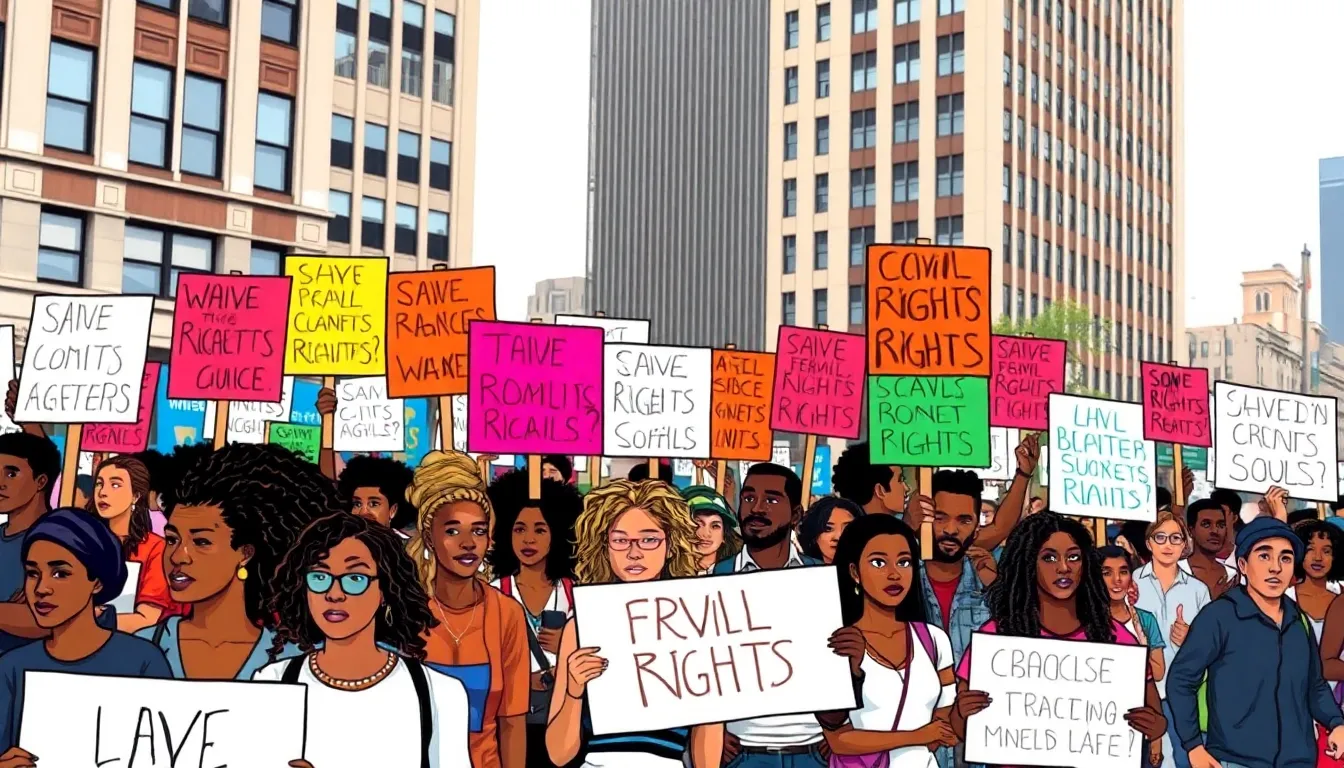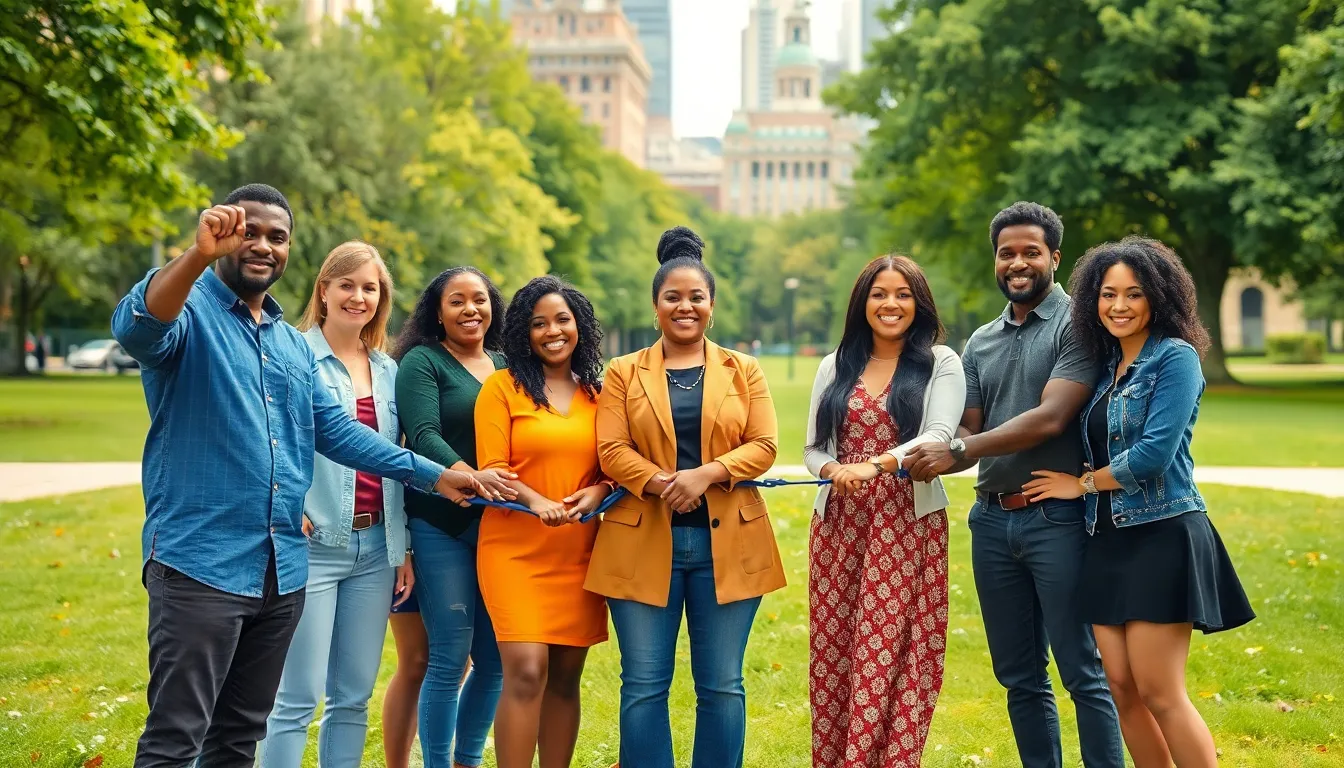In a world where everyone claims to be a rights expert, it’s easy to mix up civil rights and human rights—like confusing your favorite coffee order with a complex math equation. Civil rights focus on the legal protections individuals have within a specific country, while human rights are the universal entitlements that belong to all humans, no matter where they hang their hats.
Civil Rights VS Human Rights
Civil rights refer to the legal protections individuals possess within their respective countries. These rights often include protections against discrimination, the right to vote, and freedom of speech. Civil rights are defined by national laws and can vary from one country to another.
Human rights, on the other hand, represent universal entitlements belonging to all people, regardless of nationality or location. These rights encompass essential freedoms, such as the right to life, liberty, and security. They also include rights to education, work, and participation in cultural life.
Both civil rights and human rights aim to protect individuals but serve different purposes. Civil rights focus more on social equality within a specific political framework, ensuring that citizens receive equal treatment and protection under the law. Human rights transcend borders, emphasizing the inherent dignity of all human beings and their entitlement to fundamental freedoms.
Legal systems enforce civil rights, often relying on statutes and court rulings. In contrast, international frameworks, such as the Universal Declaration of Human Rights, guide the recognition and protection of human rights.
Several examples highlight the disparity between the two. For instance, laws in one country may protect citizens from discrimination based on race or gender, yet human rights advocates argue that everyone, worldwide, should enjoy equal rights regardless of their circumstances. Additionally, civil rights activists often work within their own system to change laws, while human rights activists might address broader global issues like refugee rights or poverty.
Understanding the differences between civil rights and human rights is crucial for both advocacy and education. By recognizing their unique roles, individuals and organizations can better navigate the complexities of social justice and uphold the dignity of every human being.
Definition of Civil Rights

Civil rights are the legal protections individuals hold within a specific country. These rights ensure equality and prevent discrimination based on characteristics like race, gender, and religion.
Historical Context
Civil rights movements emerged prominently in the 20th century. Significant events like the U.S. Civil Rights Movement of the 1960s sought to dismantle segregation and promote equal rights. Key figures, including Martin Luther King Jr. and Rosa Parks, played vital roles in advocating for change. Legacies of these efforts shaped contemporary understandings of civil rights. Legal battles and protests highlighted disparities, pushing governments to recognize citizens’ rights.
Key Legislation
Numerous laws establish civil rights protections across various nations. In the United States, the Civil Rights Act of 1964 stands as a critical milestone. This act prohibits discrimination based on race, color, religion, sex, or national origin. The Voting Rights Act of 1965 further acts to protect voting access for all citizens. Additionally, fair housing laws aim to eliminate discrimination in housing practices. Each piece of legislation contributes to the framework supporting civil rights, encouraging equality in social structures.
Definition of Human Rights
Human rights represent inherent entitlements of all individuals, emphasizing dignity and freedom across the globe. These rights serve as a foundation for social justice, promoting equality, integrity, and respect.
Universal Principles
Universal principles of human rights apply to every individual, regardless of nationality, ethnicity, or gender. These principles encompass rights like the right to life, liberty, and security. Additional entitlements include freedom from torture and the right to education. These rights are inalienable, meaning they cannot be taken away. The universality of these principles recognizes the shared humanity that binds people together. Advocacy for these principles fosters societal progress by promoting fundamental freedoms. Protecting human rights empowers individuals to seek justice and equality without fear.
International Organizations
International organizations play a crucial role in promoting and protecting human rights worldwide. The United Nations stands at the forefront with the Universal Declaration of Human Rights, which articulates a broad range of entitlements. Various agencies within the UN, such as the Office of the High Commissioner for Human Rights, actively monitor human rights situations globally. Non-governmental organizations, like Amnesty International and Human Rights Watch, also contribute significantly by documenting human rights violations and advocating for change. These organizations collaborate with governments and communities to advance human rights initiatives. Their efforts reduce inequalities and hold perpetrators accountable, working toward a more just and equitable world.
Differences Between Civil Rights and Human Rights
Understanding the differences between civil rights and human rights is essential for navigating social justice issues. Civil rights pertain to the legal entitlements granted by specific nations. In contrast, human rights serve as universal principles applicable to every individual across the globe.
Scope and Application
Civil rights apply within particular legal jurisdictions and focus on treating citizens equally under national laws. Examples include voting rights, anti-discrimination laws, and freedom of assembly. In comparison, human rights encompass a broader range of entitlements essential to human dignity. These rights uphold the inherent worth of all individuals irrespective of nationality or status, covering rights to life, liberty, and education.
Enforcement Mechanisms
Enforcement of civil rights typically relies on national legal systems and judiciary processes. Governments implement these rights through statutes that citizens can seek to enforce in courts. Human rights, however, follow international frameworks, such as the Universal Declaration of Human Rights. Organizations like the United Nations oversee the monitoring and advocacy for human rights, enabling global accountability and protection against violations.
Importance of Civil Rights and Human Rights
Civil rights and human rights play essential roles in promoting justice and equality. Their significance becomes evident when examining their effects on societies and global landscapes.
Impact on Society
Civil rights cultivate social equality by ensuring legal protections against discrimination. These protections empower individuals to participate fully in their communities. Human rights contribute to broader societal well-being, enhancing inherent dignity for all individuals. Governments that uphold civil rights create environments where freedom of expression and assembly flourish. In contrast, societies that respect human rights foster peace and stability, reducing conflicts caused by oppression. Historical events, such as civil rights movements, demonstrate tangible shifts towards equality. Notable victories in civil rights revealed the need for consistent progress in addressing inequalities at local and national levels.
Global Perspectives
Human rights encompass global standards applicable to every individual, regardless of their origin. Organizations, such as the United Nations, advocate for these universal principles to ensure that all people enjoy fundamental freedoms. Civil rights vary between nations, creating disparities in how individuals experience justice. Global attention often highlights countries lacking robust civil rights protections, prompting international advocacy efforts. Cooperation among nations is crucial in promoting both civil and human rights. Countries that prioritize human rights often set examples for others to follow, demonstrating that respecting rights benefits societal progress. International treaties and agreements provide frameworks that encourage collaboration on these rights.
Conclusion
The distinction between civil rights and human rights is vital in understanding the landscape of social justice. Civil rights ensure legal protections within specific nations while human rights emphasize universal entitlements that apply to all individuals. Both play essential roles in promoting equality and dignity but operate within different frameworks.
Advocates for civil rights work to dismantle discrimination within their legal systems, while human rights defenders strive for a broader recognition of inherent human dignity. Together they contribute to a more just society, underscoring the importance of international cooperation and awareness in the ongoing fight for equality and respect for all.

